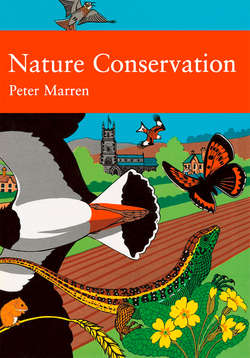Nature Conservation

Реклама. ООО «ЛитРес», ИНН: 7719571260.
Оглавление
Peter Marren. Nature Conservation
Nature Conservation. Peter Marren
Editors
Table of Contents
Editors’ Preface
Author’s Foreword
1 Introduction: Where We Are Now. Wildlife in a crowded island
Some millennial stocktaking
Discovering where the wildlife is
Site registers and monitoring schemes
From data to action
2 The Official Conservation Agencies
The break-up of the NCC
The whip hand: the agencies and their budgets
3 The Voluntary Army
4 Conservation Politics: SSSIs and the Law
The Wildlife and Countryside Act – origins and arguments
The Act in practice
The Act in retrospect
Offham Down and after
Breakthrough: the ‘CROW Bill’
Euro-conservation
5 Nature Reserves. Places of peace, havens of delight
A short review of our nature reserves
Why some nature reserves are better than others
Changing concepts of conservation
Wardening
Trust reserves
Hopes and dreams: island reserves
6 The Farmed Environment
The bad old days
Declining species
Slowing the engine: surplus reduction and agri-environment schemes
Organic farming
Straws in the wind
7 Woods and Forests. Foresters and afforestation
The Forestry Commission
The planting of the uplands
Ancient woods and nature conservation
The Scottish pine woods
Forest management for nature conservation
8 Bricks and Water
Marine habitats and species
Marine nature reserves and Euro-sites
Choking in the black gold
Fish farms and other marine conservation issues
Nature conservation in towns and cities
Urban wildlife habitats
Creation and translocation
People and wildlife
Gardens
Golf courses
9 Development: Causes Célèbres
Amberley Wild Brooks
‘The Third Battle of Newbury’
The Berwyn saga
Tidal barrages and Cardiff Bay
Against the odds: the case of Rainham Marshes
Skiing in the Cairngorms
10 Animals That Get In Our Way
Not a problem after all?
Persecuting a protected species
The ‘branchy beasts’
Strange passions
Wild geese
An endangered species in the loft: bats and their conservation
Raptors: the problems of success
11 Biodiversity
Three species
A boom in the reeds
Pearls in the river
Fungi with teeth
Biodiversity replicated
Are Biodiversity Action Plans working?
12 Sea Eagles and Parrot’s Feathers: Invading and Settling
Successful reintroductions: sea eagles and red kites
Alternative ways of establishment: plans and escapes
Plant and animal invasions
Invasive plants
Sowing ‘wild flowers’
Unwelcome guests
13 Summing Up: Whither Nature Conservation? A changing environment?
The rise of conservationists and the slow death of natural history
Job opportunities in nature conservation
A vision for the future?
Appendices. APPENDIX 1: Main events affecting nature conservation in Great Britain, 1970-2000
APPENDIX 2: Glossary of conservation words and abbreviations
Unofficial acronyms
References
Index
Plates
Praise
Copyright
About the Publisher
Отрывок из книги
Collins New Naturalist Library 91
S.M.Walters, ScD, VMH
.....
Another significant change was what the former NCC’s Scottish director Morton Boyd called ‘the fall of science’. The minister in charge of environmental affairs at the Scottish Office was Sir Hector Monro (now Lord Monro of Langholm). He had served on the NCC’s Council ‘and had grown to dislike scientists’ (Boyd 1999). The role of science must be advisory, he insisted, and should not be used as the basis of policy. Hence SNH’s top scientist, Michael B. Usher, was not the ‘Chief Scientist’, as before, but the ‘Chief Scientific Adviser’, and he was eventually excluded from SNH’s main management team. Nor were SNH’s local boards particularly rich in scientific experience. The scientists sat on a separate research board under Professor George Dunnet, later named the Scientific Advisory Committee. It was rich in IQs but poor in influence, and, fed up with being repeatedly ignored, Dunnet resigned in 1995. As Boyd commented, the standing of scientists is not what it once was. Not only were they held responsible for the disputes that had made the NCC unpopular in Scotland, scientists were also seen as an unacceptable ‘élite’. The new approach had to be ‘people-led’.
Humility? The NCC’s scientific advisory committee dwarfed by the great beeches of the New Forest. (Derek Ratcliffe)
.....